
A blockbuster among Disney+ Series. Action driven, yet luckily with subtle character portraits, too
"Moving" is about people with superpowers. “Moving” tells the stories of a variety of people with such superpowers. These superpowers definitely belong to the realm of fantasy. However, it´s nothing like the 'Marvel' universe, because despite all the action spectacle that "Moving" has to offer, this Disney+ production (based on a successful South Korean webtoon) remains true to the KDrama habitus, that life takes place in the area BETWEEN black and white. It's about shades of gray. Nobody is exclusively good or evil. Well, almost nobody...“Moving” takes aim at South Korea’s intelligence policy. The KCIA, which became the ANSP and was eventually called the NIS. The connections with the USA and the difficult relationship with North Korea come into play. Difficult, because even within the framework of an official sunshine policy, distrust and hostility are always maintained in the background.
The South Korean secret service has been part of the international elite since the KCIA was founded. The superpowers of the protagonists may be symbolic of this. The name of the secret service has changed several times, as has its official focus. However, this does not mean that the entire workforce can be replaced...
“Moving” finds its balance between political thriller, action thriller and emotionally differentiated Korean habitus. The trick: the tough agents become humanly tangible because they are also parents, worried about their children. And then another trick: the children have inherited their parents' super-powers, but have not (yet) undergone any agent programming. They are children, still relatively naive, pubescent, too...
Worlds collide. The worlds of those, who behind the curtain want to move the world in their favor (for the sake of so called bigger picture and a safer world), the worlds of those executives, more or less blindly obedient (Black Ops) agents who are needed to succeed with their missions, and the world of those, who actually make this world worth living - people with their ordinary families and social relationships.
“Moving” has 20 episodes. Numerous character and relationship portraits are drawn, all of which are somehow intertwined - the old and the young, yesterday and today. And finally altogether now for a tomorrow free from deadly intelligence agency demands.
“Moving” is, first and foremost, a KDrama with a top-class casting that aims to offer streaming delight at the highest international level. “Moving” is explicitly seen as a kind of blockbuster among Disney+ series productions - with a correspondingly hefty budget. As such, the series has entered the streaming market in a self-assured manner and immediately achieved remarkable success worldwide...
However, for my personal taste, this KDrama comes across as a bit too action driven and brutal - with those superpowerful men and women, who (despite their deadly wounds) keep bouncing back again and again and again... I might have dropped it, if not for this variety of subtle and affectionate character portraits, that make a great part of the story, too.
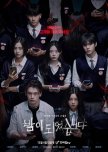
Terrifying.
And captivating at the same time.
Most peculiar.
First I wanted to quickly get out of it.
But then, somehow, I couldn't leave the girls and boys behind in their misery...
A nasty, cruel game with anguish and desperation.
And at the same time bitterly serious.
When bullying turns into a relentless, painful fight for survival...
An original but also creepy reckoning with the issue and impact of psychological and/or physical violence among teenagers.
Nurtured and inspired by what for some (far too many!) is real hell on earth.
In that sense: quite upsetting.
Therefore: ambitious and well done.
However: still scary.
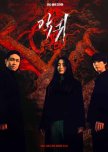
If you´re ready for what lies beyond the obvious & don´t mind a gloomy scenario, go for it
For those who don't blench from paranormal dimensions, "Revenant" is certainly a must-see KDrama. Pretty much everything is done right here. "Revenant" is a crime thriller that transcends time and space, embracing a world that is more than meets the eye and the rational mind. “Revenant” also belongs to the genre of supernatural, even horror-mystery productions. However, to reduce it to that would not do justice to this KDrama.Demons, ghosts of the deceased, people who can see such entities, and people possessed by these entities are all traditionally deeply rooted in South Korean culture. Folk religion and shamanism are still present today – sometimes more, sometimes less, sometimes not at all relevant to the individual, yet nevertheless present. "Revenant" is deeply rooted within this national culture, with Shamanistic rituals being explicitly involved here. In the mass consciousness, the supernatural world has retained a firm place over the millennia. "Revenant" specifically refers to that, (unfortunately without going into detail regarding its backgrounds.) In that sense, "Revenant" is not an unusual SBS-KDrama production for the South Korean audience. At the same time via Disney+ Streaming-Platform this series is exporting a piece of its rich national culture across the border, too - superficial as it as such may remain.
In "Revenant" Kim Tae-ri and Oh Jung-se, however, show high-end performance. Actually overall, this KDrama is in general characterized by its great casting. The acting alone makes it worth seeing. The story is unpredictable and complex, so are the relationships. Additionally, it draws from the long tradition of South Korean folk beliefs, ingeniously mixing it with a modern, rather scientific, investigative approach.
Be prepared for a suspenseful plot. The attraction of "Revenant" lies in the dramaturgically intelligent and fascinatingly presented interweaving of crime thriller and multidimensionality of being. It is obscure, too. In “Revenant” people are possessed by ghosts of the deceased, who are acting in an almost criminal manner. With conventional police investigation, murder executed by such astral beings, who materialize their intentions through their mental occupation of human bodies, are difficult to uncover.
Should you watch it? If your are ready for what lies beyond the obvious, yes. If you don´t mind a gloomy scenario, yes. It is different from your ordinary KDrama, though.
PS:
For me, however, "Revenant" is not just another highlight in a KDrama tradition that is rather fearless regarding the paranormal. The production is also one of a noticeable number of KDramas, that transcend time and space as well as this world and the afterlife, which are increasingly flooding the screens. (Especially in 2023 with i.e. "Island", "My Perfect Stranger", "See you in my 19th Life", "Heartbeat", "Durian's Affair", "Miraculous Brother" … and the year is not over yet). Ghosts, demons, reincarnations, time travel, you name it – the worlds overlap and mix, with time and space having become relative. The curtains between different dimensions are increasingly lifted. The paranormal is becoming more and more normal in the worldwide mass consciousness. Multidimensionality is a topic that people obviously increasingly like to deal with. It isn´t necessarily horrifying anymore. Not in South Korea, nor elsewhere on this planet.
In general, I find that quite inspiring, since dealing with multidimensional spaces, times and beings, has a potential to opening up new perspectives towards life. (Even if it may not all be logically satisfying yet.) It is offering a potential towards a more conscious appreciation of what makes us being human, too.
PPS:
One appealing, even salutary message that "Revenant" (somewhere along the line) would have to offer: the 'evil' intentions of the astral beings can only be as evil as the human 'hosts' allow. At some point the human has to give his or her 'Ok'. If a person has no resentment or greed and is at peace with the world, then there is not much harm wandering ghosts or astral beings in the near-earth realms can do. That would be good news, wouldn´t it... yet… compared to ghosts, eventually human beings can easily be the more frightening creatures here...
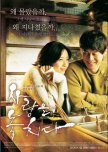
A homage to all those unhappily in love! (Wherever. Whenever.)
I´d say this is a homage to all those unhappily in love! (Wherever. Whenever.)Calm, like the water on windless days. Bare in words, instead told with images, well-placed scene settings and metaphors.
The protagonists are not so good with words, rather insecure and awkward when it comes to sharing their feelings. (But actually, nowhere in the movie is there any role model, whatsoever, from whom they could have learned better - how to deal with feelings openly, sincerely and appropriately.)
The original title was "Lost Love" or "Missed Love". But the international title “Lost in Love” is also appropriate, as the protagonists don´t seem to know how to navigate their feelings of love. This brings us back to the calm – becalm, with no wind to fill the sails. In fact, there is no tension between the protagonists - it is the drama of bad or missing timing in love. It is no coincidence that bus terminals become a structuring leitmotif.
The story of "Lost in Love" is not spectacular. On the contrary, it is the essence of a non-story. A story about a story that just doesn't want to happen. Nevertheless, it goes deep - because it relies on the effect of the blank, on the space between, on what works in the background and constantly gnaws at the heart. And this, actually, is an all too familiar, well known, painful experience for many people. It doesn’t have to be explicit. It is even more precise that way.
The KMovie has nothing to do with a typical RomCom. Nevertheless, "Lost in Love" is poetic in its own way - with an affectionate look at the unfortunate lovers on this earth: their hopes; their fear of self-confidently standing up for their feelings and thus maybe provoking the dreaded, outspoken “No!” or “Go!”; their inability to let go.
Water is the leitmotif in several ways. There is the rowing school and the fish farm representing dynamism and movement. And then there is the rain and the tears, shed or non-shed. But “Lost in Love” is also expressly colorful. With an eye for the banal details in everyday life. Authentic. Without makeup. The smell and the humid air of the monsoon summer are almost penetrating through to the audience. The landscape was handpicked, the radiant nature representing the beauty of life - even despite being unhappily in love.
The KMovie has its own idea of pacing. It develops its idiosyncratic charisma. It is the story about the non-love story, quietly told in a meandering way, as feelings are nothing one can be persuaded of... they can only be experienced... and, at best, shared... Or maybe empathized/sympathized with.
Immersive in its own way. Not for every mood. But if the timing (yes, again…) is right - for me it was a rainy autumn day - then (in my opinion) it's definitely worth seeing.
Others might say its dull and boring. Being from 2006, it is rather ´old´, too.
Well, check it out for yourself.
P.S.:
For the private lives of the ML and FL, though, it obviously worked out quite well.
They are married since 2009...

Thought-provoking KMovie, sailing close to the wind when it comes to duty of care and child welfare
The KMovie "Highway Family" is set at the bottom of the social pyramid in South Korea in the year 2022. It portrays a homeless family who seems to have found their own lifestyle at the country's highway rest stops. A happy family sleeping in a tent, living on scrounged money and having lots of fun together.That's one side of the medal. As audience, however, one cannot help but see the other side of the coin despite all the family idyll. The heavily pregnant wife has no medical support during what is now her third pregnancy. Her two children, being five and nine years old by now, miss out on any schooling. The parents claim that they do the teaching themselves, but reading, writing and maths are obviously not on their curriculum. A playground on the highway rest stops, which are heavily frequented by cars and heavy trucks, is dangerous, and the parents' duty of supervision is by no means guaranteed. The father is (as so often) the head of the family and objectively speaking, his decisions about the self-chosen outlaw family life sometimes border on violating his duty of care. Supposed (motorway rest stop) idyll and freedom may correspond to the father and his outlook on life. Wife and children, on the other hand, are now stuck in this boat. They love each other as a family and especially the children know no different. They rely on their father.
The KMovie sails close to the wind when it comes to moral issues concerning work, economy and society as well as duty of care and child welfare. Camps may form in the audience. And that is intentional.
The second protagonist, alongside the Highway family, is a married couple who lost their own child and who run a second-hand furniture store. Solid. Prosocial. Responsible. However, emotionally deeply wounded and unhappy.
Worlds clash. Two families meet. One is shattered deep inside, the other formally. Together they build something new - an alternative family patchwork, grounded in a rather simple normal life, which obviously doesn't have to be the worst, at least when kids are involved. Yet, can it be as simple as that? And at the disturbing end there is the question about the end of the story... which remains in the eyes of the beholder...
A thought-provoking KMovie.
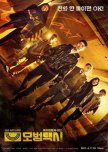
Being a victim in the face of injustice is the worst – revenge promises release of suffering
Dealing with some actual crimes in South Korea, "Taxi Driver" retells them from the perspective of the victims - a variation of vigilante justice is the driving force and explosive in the plot development. A lot of action is guaranteed. The pace is high. There's nothing tear-jerking about. Romance has no place here. However there is room for emotions.Although the crimes are extremely brutal and unscrupulous as well as the fights and chases don't sugarcoat anything - Taxis Driver is overall fun to watch (not in the sense of ´funny´ though!). On the one hand, this is because the perpetrators are caught and the victims actually get 'help'. On the other hand, and above all, it is the actors. Not only the team around Kim Do-gi, also and especially the individual villains in male and female versions. While on the one hand turbulent action fills the time (yes, for me personally less would have been more, but that's probably a matter of taste), it's actually the theatrical performance of the mimes that characterize the esprit of the series. The fact that Do-gi has to slip into new roles for his assignments has a certain charm - i.e. sometimes he mimes the inexperienced substitute teacher, sometimes the gallant, wide-legged criminal with a fur coat...
It's still quite a brutal TV serial. That's because of the cases. Yet they aren't invented. It helps that there is room for a pinch of humour, harmless situation comedy and a wink every now and then.
Despite all the vigilantism, which is the driving and fundamental premise of the entire series (and probably also of the 2nd season that is already planned), it is respectable: there is also a serious examination of justice/injustice, law/judiciary and the state's monopoly on the use of force. The brilliant public prosecutor Kang Ha-na in her idiosyncratic way and her team are excellently suited to this. The heroic deeds of the 'exemplary taxi crew' are thus not only whitewashed, but also rightly confronted. The script has in that sense hit a fine line that doesn't take away the joy of satisfaction, but still puts a question mark behind vigilantism, and thus gives credit to honest, committed and highly motivated law enforcement officers - because the country needs them. Vigilante justice, that should be clear, cannot and must not be the solution. (Human history is full of cultures of lynching and blood feuds - certainly this never did and will not promise a better world.)
And then: the heroes of the story are human beings, too. Flashbacks provide an insight into the taxi team's traumatic, formative past while tying them into current cases. They too are victims. On this earth there is probably hardly any person who does not have had the experience of being a victim in the course of their life - more or less traumatical. It is an ugly feeling, a deeply shameful experience, as it reminds mankind of its greatest weakness: the ultimate loss of control and helplessness inherent in the finitude of being, the inevitable surrender that sooner or later everyone awaits.
Accordingly, forgiveness and reconciliation are also a topic of this KDrama. However, this is ruled out as a serious option quite early on. A nice concept, yes, but rather not practicable, because people prefer to thirst for revenge. In this story, the emphasis is on the satisfaction of such. There are others, emphasizing that the pain doesn't go away with revenge. Because the fact remains: For a victim, the past cannot be reversed - in fact, the pain associated with it and the feelings surrounding it are rarely in the past anymore. They shape life from that moment on, become a part of it in the here and now. The experience cannot be erased or undone. In this respect, revenge on the perpetrator doent´t help either.
Taxi Driver gives less importance to this consideration. That's actually my only (but not insignificant) criticism. The series prefers to ride the obviously successful Speed&Action wave. Because otherwise that would have robbed the KDrama of the basis for the second season, so to speak. Consequently, they want to build on the success of the first. (Without Esom in the role of prosecutor Kang Ha-na, by the way, since she apparently left the actors´ crew due to other appointments.)
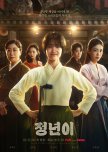
One of the exceptional productions of 2024 in several ways
"Jeongnyeon: The Star is Born" is one of the exceptional productions of 2024: exceptional in terms of the subject matter and the rather specific cultural background, as the KDrama celebrates two very South Korean art forms: the post-war all-female performance theater Gukgeuk and Pansori, a chanted epic narrative rooted in Korean culture. Exceptional also, because this KDrama creates a women's space in which women play the decisive role and are explicitly NOT reduced to their gender role. Finally, exceptional when it comes to the acting performance: in this case in two respects, as the highly committed actresses present us a show within the show. Definitely worth seeing. (At least, I´d say…)The international title is perhaps a bit misleading, because actually no one is 'born' as a Gukgeuk star. This is hard work, even for those who may be born with talent. That is exactly the theme of the story of this KDrama. The historical setting of the 1950s may seem old-fashioned - who cares about such a special theater movement that was there only for a few decades and has by now been almost forgotten? No way! The topic obviously is quite on. The South Korean audience is thrilled. In the viewer statistics, the numbers have multiplied over the 12 episodes. No wonder, because the plot itself could easily be set today, 2024. The Gukgeuk training is actually comparable to the modern KPop idol industry. Accordingly, individual struggles with personal limits and challenges, the dynamics of relationships, as well as competition, infatuation, friendship, love-hate relationships, envy, self-doubt, overestimation of oneself and ultimately the overexploitation of one's own strengths and possibilities are practically timeless.
But due to the fact that these personal processes of the protagonists are located back in the 1950s, they simultaneously bring the art form of pansori and the flowering of the (now almost forgotten) gukgeuk to radiantly fresh, rousing life. By introducing us to three generations of gukgeuk and pansori stars and bringing them closer to us emotionally, we get a lasting impression of the extraordinary South Korean cultural heritage. (If you are interested, see the side note below.)
The original title is just "Jeongnyeon". The story is based on a well-researched webtoon. While the webtoon focuses on the main character and her personal development processes, the KDrama focuses on the relationships that shape Jeongnyeon on her path as well as the other women, young and old alike. The KDrama "Jeongnyeon: The Star is Born" vividly embodies the quality and the (short) history of Gukgeuk using the example of three generations of Gukgeuk artists. Wonderfully done so. The webtoon also achieved this in 2019, and was even specifically awarded by the Ministry of Culture for the outstanding quality of the story and also for its contribution to raising awareness of gender equality in South Korea.
Kim Tae-ri leads a fantastic ensemble. But even if she once again surpasses herself here, she is not alone, but the whole, which is more than the sum of its parts – just as the show on the Gukgeuk stage is a co-creation in which everyone is giving their best, according to their role and tasks, so that something great can come of it. And so all the ladies contribute in their own unique way to the success of this fantastic production.
------------------------------------------------------------------------------------
--- SIDE NOTE: Pansori ----
Pansori is almost unique: a very old form of epic narrative singing that goes back a long way in Korean cultural history and is able to generate maximum emotional charisma using minimalist means. This requires one person to tell a story by singing and one person to beat the drum. The emotional power of the different dramatic moods is characterized by a stylized repertoire of vocal use and expressive performance. This in combination with the equally characteristic rhythms of the drum beat. A one-person opera in which one person plays ALL the roles, so to speak.
The roots of the idiosyncratic sound in combination with the drum go back to Korean shamanism. In the 17th century, it became an art form in its own right to captivate people with a wide variety of stories in street theater. This is also what the name “Pansori” refers to. "Pan" means a place where people come together, while “Sori” means the expression of the voice, the singing. By the 19th century, pansori had the attention of the upper class and was formally refined. It is about the stories that have shaped the lives of people on the Korean peninsula for centuries – highly dramatic and emotionally expressive. It´s fueled by the relationship being established between narrator and audience. No monologue, no lecture. Rather, narrator and audience meet in the intimate, emotionally honest, vulnerable space that the story opens up - in compassion for its protagonists.
Not everyone can just do pansori. This narrative singing is special. The training is hard. In addition to singing, there is a repertoire of facial expressions, gestures and forms of movement that are given in their structure but must be completed individually. Characteristic of the incomparable singing is the anhemitonic pentatonic scale used, in which the semitone steps E to F and B to C are missing. This is used in different emotionally colored modes, each of which is defined by a specific pitch. Frequency, ornamentation and emphasis emphasize the different emotional states even more. The rather hoarse voice quality is also characteristic, especially in the lower octaves. A clear voice is not required in Pansori. The falsetto technique is used for the higher pitches.
Since the 1970s, pansori has had state-recognized status as a Korean cultural asset in the country, and since 2003 it has also been officially listed by UNESCO as an intangible cultural heritage.
--------------------------------------------------------------------------------------
--- SIDE NOTE: Gukgeuk ---
Gukgeuk is not that well known and is not particularly protected as a Korean cultural asset. Gukgeuk refers to purely womens´ theater for music and theater performance. An art world, a theatrical art creation created exclusively in women's spaces. The women also took on the men's roles. In the post-war years, Gukgeuk was extremely popular in South Korea. The fan cult was in no way inferior to today´s idol fan cult. However, not much of that still remains today. The Gukgeuk theater performance began as a purely womens´ theater in the 1940s. It reached its peak in the 1950s and 1960s. But then the decline followed closely with the growing of the film industry, because there the tried-and-tested stars could earn more and the reach was also greater.
Gukgeuk is characterized by traditional Korean performing art forms and in particular pansori, but combines elements from theater, music, song and dance in an idiosyncratic way, like a quintessence. In contrast to traditional Korean opera (Changgeuk), in which men and women perform aside, Gukgeuk places greater emphasis on high quality acting. Expression, grace in movement, facial expressions, all of this is integrated more finely and intensively into the performance. That’s where all-female production comes into play. A great voice alone is not important with Gukgeuk. Rather, it is the ability to embody the mood of the story sensitively and authentically, to emotionally resonate with the audience and to carry them along uncompromisingly, catapulting them out of their everyday world and instead drawing them into the story with all its emotional facets.
The women were celebrated as stars. They were celebrated as artists. Some were perfected in their appearance, language and behavior for the male roles. Thus, the Gukgeuk artists were able to experience themselves outside of their gender roles.
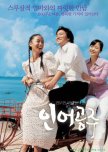
A little gemstone of its own kind
"My Mother, the Mermaid" is a KMovie gemstone. Old school it may be, however offering a sweet and empathic, yet down to earth (love) story without any polish, instead with a little bit of magic mixed in. Overall, the KDrama is ruthlessly rooted in the normality of a fairly simple (and also very South Korean) life.The most important about "My Mother, the Mermaid": A fantastic Jeon Do-yeon in her double role, a Go Doo-shim in top form, authentically rustic Haenyeo and Jejudo flair of the 1980s and the 'wonder´-ful story about a daughter, Na-young, getting to know more about her rather brash mother and her great love - Na-young's emotionally rather absent and ultimately disappeared father.
Sometimes there are worlds dividing (happy moments in the) past and (perhaps quite sad, desolate) present. But even if the present may now look completely different and happiness may seem to have long been lost, the happy, beautiful moments of the past somehow live on, well protected and guarded within the heart.
And sometimes we may evaluate a situation, a person or a relationship completely incorrectly or at least completely inadequately. Simply because we don't know everything yet...
The KMovie turns out to be an almost tender encouragement to approach life a little more humbly and calmly: Less judging and evaluating - because it kills the moment between here and now. Being open more often - because in doing so we give life a new chance with every moment.
-----------------------------------------------------------------------------
SIDE NOTE: --- On time, context and background ---
The KMovie from 2004 begins with a sequence that is set in the past during Asian crisis (late 1990s) - the son is inheriting his deceased father's debts... in that case however, his money mainly comes from his wife...
At first we can't understand why the mother insists so much that her large share of money she brought into the marriage was earned by herself and belonged to her, not him - and why it is so important to her that it was intended for her daughter's studies...
…The protagonist's mother was Haneyeo on Jejudo Island. These women of the sea – 'mermaids' – may not have had any formal school education in the past, but they always earned well because they dive for the sought-after, expensive seafood on the deep seabed and harvest it laboriously by hand with their spatulas. (Until today apparently only women can do this freediving job well.) The Haenyeo are people of respect on Jejudo, not least because of their financial independence. They are perhaps the only truly self-confident women in South Korea who are traditionally respected to this day and also have a naturally developed self-esteem as women (not just as potential wives!)...
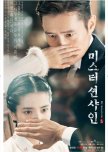
This KDrama is more like an epic movie that (fortunately) doesn't want to end over 24 episodes
"Mr. Sunshine" is pure epic! Visually stunning! Heartbreaking. With a fantastic cast! In addition, there is a vivid and at the same time gripping history lesson (dealing with the turn of the 19th / 20th centuriy). The KDrama is more like an epic movie that (fortunately) doesn't want to end over 24 episodes. Complex characters, interwoven developments with sudden twists, cinematic camera, unforgettable soundtrack, everything seems handpicked, nothing off the shelf. The budget was correspondingly high, but it isn't just good because it was expensive. Rather, it is made with a lot of love from front to back and down to the last detail. There are hardly familiar motifs that we have often seen in variation. Everything is precisely coordinated in all scale levels. The personal decisions that the protagonists make over and over again in the course of the story remain unpredictable until the end.Historically we learn about the relationship between Joseon and the Japanese, but also with the rest of the world. The story takes place before the country becomes a Japanese protectorate - in that brief window of time when Joseon (after a long period of isolation) became the Greater Korean Empire and then opened up to the rest of the world. For this reason, the USA also play a role in here, because the States - like Russia and Japan - are ready and waiting to get involved in the imperialist competition for the largest slices of the cake Joseon is offering. The country is rich in raw materials and therefore hot property. "Mr Sunshine" provides a vivid and gripping introduction to those geopolitical complications.
------------------ SIDE NOTE --- Historic setting: Joseon and the rest of the world ...
Since the 17th century, Joseon rather had itself isolated from the outside world. This rigorous attitude ultimately led to the first military confrontation between Joseon and the USA, which marks the kick off point to the plot of "Mr. Sunshine". In 1866, an American ship, the SS Sherman, entered Korean waters via the Taedong River. Since it did not turn around immediately when asked, there were violent arguments in which the ship was ultimately set on fire. This was followed in 1871 by the battle off the island of Ganghwa-do, in which the USA wanted to rescue the survivors of the shipwrecked crew and at the same time establish the first prerequisites for trade relations. However, since the desired diplomatic gesture of the Korean apology did not happen to take place, the Joseon garrison on the island was radically wiped out by the American warships and their crew. This first conflict with the USA went down in history as 'Shinmiyangyo'.
King Gojong came to the throne in 1873 and, in contrary to previous national policy, decided to open up his country in the hope of flourishing trade and technical innovation. Japan pushed ahead and forced the Japanese-Korean friendship treaty of 1876 on the king, including military pressure, too. However, this was a contract between unequal friends... In the course of the international processes that had been initiated, King Gojong also sought contact and trade agreements with Western countries.
---------------------------------------------
During this time, "Mr. Sunshine" stages its main plot, in which protagonist Eugene, as US officer of loathed Korean descent, is supposed to sensitively, competently and diplomatically represent the interests of the USA with a consular mandate. But there is always more life has to offer... Eugene has to meet the love of his life, face his roots and reconsider his values in life. He can´t help it: he has to take a stand...
It is said that not everything is historically 100 percent precise, but the historical circumstances provide plenty of material for pure epic drama at its finest. Thrilling. Unforgettable.
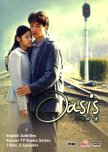
Close to the protagonists - format may be 'old', but script is round, coherent and flawless
I stumbled across "Oasis (2003)" or "Desert Spring" in the context of "Oasis" from 2023. I was curious if there were any parallels (besides the title). There are. Whether they are random or not, I don't know though. The 1940s/50s (in "Desert Spring"), like the 1980s/90s (in "Oasis"), are neuralgic phases of liberation from oppression in recent Korean history. HERE the last years of the Japanese colonial era and the Korean struggle for independence as well as the time under the occupying powers (e.g. USA) form the framework of the story, THERE the time of the dictatorship in the face of an increasing democracy movement. HERE it is radio, music and broadcasting, THERE film and cinema, that open up space for hope, visions, resistance and dreams. Here as there is a rival (who is HERE written more three dimensional than THERE) who refuses to see that the heart of his beloved already belongs to someone else. In both cases, the rival is on the side of power. In both cases the male protagonist is a talented but penniless young man who is in danger of getting underneath the wheels of the influential. Here as there, the female protagonist is a patent woman who knows what she wants.Apart from that, however, many things are different. In particular, the narrative style in "Desert Spring" is a lot more poetic, more visually impressive and with the camera emotionally closer to the protagonists than in "Oasis". Style and format may be 'old', but the script is round, coherent and flawless. HERE (more than THERE) the feelings (and struggles) of the two leads for each other take up most of the space. Almost the entire first episode tells the budding relationship between the two leads in impressive, emotional scenes with plenty of ambience of that time. The time from childhood to adulthood is sensitively sketched without many words. The sequencing and entanglement of events is suggested rather than worked out. However, the story is always close to the two young people who gradually come closer to each other over the years through a chain of coincidences. HERE the way to go is the goal. This was always against the background of Japanese colonial rule, the Korean followers on the one hand and the underground struggle for independence on the other. Music and radio form the context in which the two protagonists develop, prove themselves and finally meet and commit to each other as man and woman. But they don't live in a vacuum. For various reasons, Gi-hyun is a thorn in the eyes of the pro-Japanese collar & tie-wearers from the executive floor. Suddenly, Gi-hyun is on a red list. And even the end of colonial rule does not erase the past.
The KDrama only has three episodes, but they pack a punch. The third actually comes as a double pack with two hours. Impressively told, the story definitely leaves its mark. Even if the leads may not be so familiar to Western audience (compared to superstars from the newer KDrama productions), at least Song Il-gook has cult status in his own country, since "Jumong" at the latest.
A KDrama that uses creative means to reappraise a piece of bitter history in passing while telling a touching love story.
I stumbled across "Desert Spring" almost entirely by accident. Thanks to "Oasis" (2023) I found "Oasis" (2003). At this point, my sincere thanks go to the KDrama "Oasis" (from 2023), because without this reference to the namesake, the more than 20-year-old 'precursor' would certainly not have fallen at my feet.

Full of vitality, vigor & inspiration. Love & passion apart from clichés - tender, true & touching
Wonderful. Just wonderful. A highlight among the KDramas of 2022.I would rate it "particularly valuable". On all levels. Right down to the soundtrack.
The story has a stimulating, inspiring, at times downright thrilling effect, above all thanks to a brilliant Kim Tae-ri. She was 32 at the time of shooting, but effortlessly she plays a teenager with an ambitious dream of her own in times of adversity.
"Twenty-Five Twenty-One" is packaged as a teen story told in two timelines. Then and now. The protagonist from back then is today's mother. Today she is at odds with her daughter, who wants to give up her ballet career. In her grandmother's house, the rebellious teenager finds access to her mother's youthful past, who in turn also had difficulties with her mother at the time, yet courageously pursued her dream of becoming a fencer on the national team.
Romantic feelings are inevitable as the story progresses. Yet this storyline develops quite idiosyncratically beyond expectations, not least because of the two timelines told in parallel. Here, Love is shown more in the quality of an inspiring, encouraging, empowering 'rainbow', as the two protagonists so nicely state. It's a shame that you can't leave love like that, but sooner or later want to capture it, tie it down and pack it into a rather common concept of 'partnership' - with all the expectations and disappointments that come along with it...
"Twenty-Five Twenty-One" doesn't see itself as a Rom+/-Com fairy tale. From the start, it's not a fairy tale. Here the goal in life isn´t the happy-ever-after-family-life as such. It tells about what it means to have a dream and to follow it courageously, even if you wonder why at times. It talks about following your own precious heart, even if it might break the hearts of others in the process. It tells of passion. And of love in its very different shapes and sizes. "Twenty-Five Twenty-One" has its unique focus on love in a very tender, true and touching way - apart from clichés. It's about romance as a formative force in life, yet the story doesn't focus on glorifying romance.
In fact, the story is full of vitality, vigor, hope and joie de vivre in the face of one of the worst post-war economic crises South Korea has gone through.
In this respect, the KDrama also offers an explicit insight into the social and societal effects of the economic crisis of the 1990s.
(So here's a also side note on that context, if you are interested.)
-------------------- SIDE NOTE: ---The Asian crisis of the 1990s, the structural adjustment program of the International Monetary Fund (IMF), and the nationalist sentiment of the people that paved the way for South Korea's neoliberal globalization---
In the course of the Asian crisis, the IMF implemented its structural adjustment (SAP) in South Korea from December 1997 to December 2000, which is still considered a great success today. Others say the rise is due to the people's disciplined national consciousness. However, the massive economic slump that South Korea experienced in the vortex of the Asian crisis is undisputed. Neighter ist the impressively successful recovery since 1999.
After international investors withdrew their loans in the face of the uncertain crisis situation on the Asian continent, South Korea fell into a balance of payments crisis. This is where the IMF came into play, putting together its most comprehensive rescue package to date, with bailout loans totaling around USD 58 billion. The condition: the country was to fulfill an SAP program for three years: In addition to a consistent policy of high interest rates, government austerity measures, complex capital market liberalization and the restructuring of the financial system were required.
As a result of the balance of payments crisis, numerous banks had already filed for bankruptcy or had been nationalized. Due to the IMF's high-interest policy, countless corporate insolvencies followed in the first three months of the SAP, including some Jaebeol conglomerates. South Korea paid the price of its economic boom of the past decades, which was founded on high debt and growth rates. Unemployment tripled. Gross domestic product fell by 6.7 percent within a year.
The impressive recovery that has followed has been possible at the expense of the general population. South Korea's rapid return to the top positions in the world market is a special case worldwide, which was probably achieved less by the SAP of the IMF than by the nationalistically highly motivated South Koreans. They have written the possibly questionable, but at the same time fascinating economic success story on their backs.
First: People became victims of far-reaching processes of rationalization and concentration. On the one hand, this led to mass redundancies and, on the other hand, to a more flexible labor market. Many of the demoralized unemployed didn´t even try to find their way back into the world of work anymore. Others were employed as irregular temporary workers (e.g. with less pay, security and rights). After the crisis, these ´irregulars´ made up more than half of the workforce and their share still is far higher than in other OECD countries.
Second: The benefit of a very unique South Korean nationalism motivated many people to be willing to make personal sacrifices: they consciously avoided consuming imported goods, while at the same time the export of their own goods increased significantly. The need for foreign capital for the upswing is actually estimated at only 5 percent. The share of exports in GDP increased from 25 percent in 1996 to 41 percent in 1998. 95 percent of the net inflow of foreign exchange during the lifetime of the SAP came from the current account surplus. This was made possible by a disciplined population, who did not try to storm banks in a mass panic, but were even willing to exchange their private currencies and savings themselves, including in large gold collection campaigns, in favor of the national reserves in the weak national currency.
The macroeconomic success that has grown out of this nationalist attitude at the expense of the population is enormous. Many lost their jobs and their fortunes. Nevertheless, the South Koreans mostly got involved in the Buy-Korean campaign and avoided imported consumer goods. I.E. incidentally, the market share of South Korean films in cinemas has increased in this context from 23 percent in 1996 to 50 percent in 2001. (An aspect that also gets its own space in this KDrama...)
-----------------------------------------
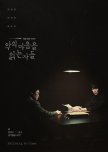
Facing the dark side of humanity. Slow Food for Thought. Intense. Powerful.
"Through the Darkness" takes an experimental approach within the crime genre. It is the serial adaptation of the autobiography of the first South Korean specialist in criminal psychology case analysis, Kwon Il-yong - about his pioneering work in the profiling of serial killers. His extensive research work was inspired by the methods of his American role model Robert Ressler of the FBI's Behavior Analysis Team, who also contributed to the introduction of the term 'serial killer'. The original title is "Those who read in the hearts of evil". Accordingly, the story essentially revolves around the approach of the young investigator to a 'new' form of criminalistic work: tracking down serial killers and their motives, backgrounds and intentions differs from the police work that was common up until then (1990s), since the selection of their victims appears at first glance to be arbitrary, motives are not immediately apparent and their 'gain' in the act is mainly of a psychologically peculiar nature. In order to be able to understand these psychological processes, a database of known psychological offender profiles first had to be created on the basis of comprehensive behavioral analyses. There is a lot of hard work behind it. It took a good decade before a separate unit for operative case analysis based on the American model could be created in South Korea, too - despite a great deal of opposition."Through the Darkness" is about approaching the darkest, most abysmal world of feelings and thoughts of the most brutal serial killers. While the story is also experimental in terms of pioneering the profiling itself, as far as KDrama goes, I mean mostly the way the real cases are processed and presented. There is no superficial plot about the story of the protagonists (let alone a romance). Nevertheless, relationships among colleagues develop over time. It is not 'suspenseful' in the sense of a thriller, because the perpetrators are always known in advance, at least to the viewers. Together with the investigative team, however, we set out to learn to understand the behavior in order to get a 'grab' for the investigation and arrest. This is quite fascinating and captivating. Inevitably, the viewers also enter the psychic worlds, which seem to be devoid of any humanity, and learn to grasp the pattern of loose threads.
In the beginning, the perpetrators were also just people (and not monsters). Not any longer though? When did something decisive change and why? The existential questions and the confrontation with his own darkness, which the protagonist is forced to face during his field research, do not go unnoticed by the viewers either. Kim Nam-gil embodies the lonely path of the profiler in a minimalist, haunting, and compelling way. Thrilling! But not exciting in the classic sense. Powerful. Deep. Slow Food for Thought. Highly valuable. But to be enjoyed in moderation (risks and side effects for the minds of those who 'read the hearts of evil' cannot be ruled out...).

A balanced mix of pleasant feel-good with sad life challenges and social grievances
"Castaway Diva" tells the story of a musically talented young girl with a very deep passion for a particular South Korean singer and her nationally acclaimed songs. “Castaway Diva” also tells the story of a lifelong childhood friendship.The plot summary implies a survival challenge with the promising scenario 'lonely girl for 15 years on a desert island'. Survival challenge may be the topic, but as far as the protagonist´s years alone on the island is concerned, the KDrama spends only a comparably short time on that aspect. It is rather about the (lifelong) challenge of ´some´ to survive their family burden...
'15 years on a lonely island' (however - don´t be mistaken - not in the South Seas or anything like that...) is a nice, original hook that once again introduces us to an attractive side of South Korea (in you like, there is a see side note below). Those years on the island basically form the cleverly knitted background for a firm, characteristically differing profile of a young woman who is intelligent, but comparatively not as consistently socialized in South Korean society and its strong traditions as the rest of the population. Due to her youth, which was for 15 years free of parental upbringing, school instruction and social comparison, yet inevitably well-grounded in everyday survival in the great outdoors, the protagonist brings refreshing clarity, simplicity and directness back to the modern lives of those around her in South Korea 2023. With her almost at the same time naïve and outrageous freedom in thinking and acting, the FL conveys independence and self-reliance in the midst of a society dominated by class, hierarchies and patriarchal family structures. In the midst of modern South Korean society, she hasn´t lost her authentic, creative spirit along the tiring path of competitive education while growing up. She is not, like so many others, gagged by acquired decency, and certainly not disillusioned or frustrated. She impulsively acts on instinct and follows her heart. This has worked for her so far, e.g. surviving her time on the island (and largely overcoming her childhood experiences, too.)
Within this framework, the KDrama is embedding the issue of domestic violence. In fact, this unfortunately still quite widespread, extremely sad problem is dramaturgically tackled in a resolute, rather offensive manner. This topic in its frighteningly powerful might is actually the source of the story´s suspension that runs through all 16 episodes in a tirelessly consistent, incredibly sticky manner…
And the music... yes, the music... This always becomes a balm for the soul. Even if competition in the music business might interfere here and there, music as such inevitably brings heart and soul together. The music brings light into the darkness. For the story overall it becomes the source of life force and healing, too. (Regardless, whether I personally dearly like the songs or not.)
So actually, “Castaway Diva” has quite something to offer. A KDrama that (for a change) isn´t set within the world of the fashionable upper class, and doesn't target the usual RomCom style (however, doesn´t dare to do without it either... well.). Instead, “Castaway Diva” is facing common life with its socially problematic issues in a fairly grounded way and in the process tells a likeable, bright story.
In would recommend "Castaway Diva", if you do not want it to be that intense, yet nonetheless some (easy to digest) profoundness is desired, too. Despite the commotion, with this KDrama an overall positive radiation prevails, i.e. thanks to the consistently positive charisma and straightforward demeanor of Park Eun-bin (- as well as Lee Re as young FL.)
I consider the heartfelt development dynamic of the relationship between the two women - the fan and her star – to be quite felicitous. As is the affectionate patch work family vibe. And always inspiring, the cheerfully thrown in bits and pieces of wisdom that life in nature (as opposed to school education) has taught the FL...
Overall, a balanced mix of pleasant feel-good with sad life challenges and social grievances.
-------------------------------------------------- -----------------
SIDE NOTE:
--- Stranded on one of the 1,000 islands in the southwest of South Korea (and NOT somewhere in the South Seas...) ---
In the Yellow Sea in the southwest of the South Korean peninsula, there are well over 1,000 islands of different sizes. Many of them are downright mini and not even inhabited. It might happen that no one sets foot on one of them for decades.
In recent years, between some of the larger inhabited islands bridges have increasingly been built. Yet, many of them can still only be reached by water. On the islands you can find an ecosystem with virgin forests, wetlands and mudflats that has remained largely untouched by modern human life to this day. Accordingly, this region of 1,000 islands, which extends to over 3,000 km², is now listed as a UNESCO biosphere reserve.
Life between ebb and flow is determined by agriculture and fishing. Thus life is simple, slow, and for some people rather boring. Accordingly, the young are leaving... and the region is overaging.
However, the gifts of nature offer pure abundance. Fishing is often done with bare hands. Mussels and crabs can be collected from the mudflats. Mung beans, soybeans, sweet potatoes, rice, chili and sesame grow abundantly. There are also a variety of findings you can collect on the beaches. You might literally stumble upon small and large treasures. For several centuries, trade with the West took the route through the Yellow Sea. After heavy thunderstorms, many ships have capsized over time up to this day. This is why the maritime region has now been officially listed as a historical site. Deep sea diving for treasures from the Song and Won dynasties of the Chinese Empire, which have been well preserved in shipwrecks in the salty mudflats, has therefore become quite popular. (The FL in "Castaway Diva", however, is more interested in the very mundane, modern flotsam that keep washing up on shore after thunderstorms...)
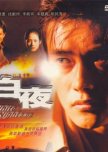
North against South. One (if not the first) Spy-KDrama, atypically action-packed… but hard to get
In 1998, "White Nights 3.98" as a TV production for the first time ventured into completely new territory - not only spatially but also in terms of content. It is about the espionage activities related to the development of advanced nuclear weapons, as well as conflicts between the United States, Russian secret services and mafia, which are carried out on the backs of North and South Korea. The title "White Nights 3.98" on the one hand refers to midsummer nights in northern latitudes and thus to the scene of action: Mongolia. On the other hand it relates to the supersonic flight speed measured in the ´Mach´. Here '3.98' denotes the speed at which one of the protagonists is traveling in a key scene.------------------
As a child, Min Gyeong-bin had actively witnessed the heroic death of his father, who was able to foil the assassination attempt by North Korean Unit 124 on President Park in 1968 while deployed by the Jongro police. His childhood dream is to become an Air Force pilot, dancing through the air at high speed. Gyeong-bin actually manages to be trained as a pilot, but due the circumstances he ends up being deployed to the secret service. His target is nuclear researcher Anatoly Jang, who is deputy director of the Institute for Atomic Energy Research in Irkutsk, Russia. The FSB, the Chechen mafia and the North Korean secret service are also interested in him, secret information and the latest generation of nuclear bombers. The Nort Koreans mobilize one of their best snipers: Kwon Taek-hyeong.
Taek-hyeon's father was part of Unit 124 at the time. As the black sheep of his family, Taek-hyeon usually had a hard time. After helping his first love Anastashia to flee south through the Imjin River as a teenager, he also lost his heart along with her. He learned how to shoot as a soldier, and as an unscrupulous sniper he can now be bought around the world - including a terrorist rebel group in the Arab world, far from home. Now, however, he is hired by his own people. He's supposed to eliminate Anatoly Jang. Far too late he realizes his target being the father of his first and only love, who in turn is now an agent of the Russian FSB...
-------------------
This KDrama is atypically action-packed: with flight scenes reminiscent of Top Gun, a trigger-happy sequence where the North Korean protagonist shoots himself free in Rambo-style, underwater scenes in the Imjin River (that flows through the demilitarized zone), explosions, and more. The KDrama actually opened up a spectacular new genre in the South Korean series world. And yet. "White Nights 3.98" had a difficult stand in South Korea in several ways. Ratings started high and then plummeted.
There are several reasons that tell us more about South Korea, than about the KDrama. "White Nights 3,98" is based on the novel of the same name and is an exciting and thoroughly entertaining, at times well-done as well. It is also documenting, that in spite of Cold War having already ended, North and South Korea with their particular political dynamic represent the last and still red-hot stronghold of a Cold War that is actually still going on. However, the KDrama comes to TV at a time when the North and the South just startet to look to the future with more optimism, with their hopeful, positive "sunshine politics" and the newly created Kŭmgang-san region dedicated to South Korean tourism in North Korea. "White Nights 3.98" might present a hot topic that is always up to date, though it completely missed the social topic of the time. People didn't really feel like giving their hearts to warring spies - North against South. So even though at the beginning, the series was still in third place, its ratings rapidly went down.
There is another reason for this. A considerable part of the scenes (3 out of 12 months of shooting time) were shot abroad, mainly in Russia and partly in Uzbekistan. This brings exotic flair to the series orbit, which in KDrama is otherwise concentrated on the peninsula. (Compared to other KDramas, the total production costs were accordingly three times as high.) However, the international subject matter, the dramaturgical interdependence with the secret services of the USA and the Soviet Union, also required native speakers who could easily find their way around the South Korean set. It repeatedly seems to be a problem to find a suitable cast - a problem that I already encountered in "Sad Love Story". Eventually, the acting performance of the Russian and American casts can´t keep up with the rest of the production. That's really a shame, because it not only offends the eye, but also the ear.
Yet, the production had to take another criticism. Director Kim Jong-hak, who excited the masses with "Sandglass" just a couple of years before, now caused offense by working with deliberate reminiscences of that earlier production - with similar or even the same scenes. One or the other seemed strangely familiar to me, too. But those who don't know "Sandglass" won't mind. And even so, it doesn't really have to bother. Nevertheless, it was not well received as a 'gag' at the time. The South Korean audience was 'not amused' about it.
Additionally, criticism referred to the rather sloppily drawn central character Kwon Taek-hyeong. In the original novel, the protagonist, who is difficult to grasp, is probably a lot more understandable in his ambivalence and complexity. The series massively simplifies/slims his profile. There is comparatively little left of his dark, evil, unscrupulous side in the script. Little remains of his ambivalence either. You also learn practically nothing about that background. Finally, the story of how he went from being a teenager to an unscrupulous terrorist is simply left out. Only the painful loss of Anastashia remains. In the series version, Choi Min-soo had to make up for a few things with his presence in order to convey a strong profile to this tragic character.
"White Nights 3.98" may be a spy thriller, but it's not a about male heroes only. There are plenty of women involved as events unfold. Of course, there are also tragic entanglements in love. Ultimately, the driving dramaturgical forces are not ideologies, people and homeland, but heart and pain, impulsive and human decisions. Whatever one may accuse "White Nights 3.98" of, it comes up with strong emotional moments in the proven KDrama manner.
By the way, here you can see Park Eun-bin making her acting debut as a six-year-old, and Song Hye-kyo was still in the starting blocks of her career back then, too... if ever you get to see the KDrama. With subtitles it is (currently) difficult to get...
----------------------------------------
Historical SIDE NOTE:
For me, in connection with "White Nights 3.98" (besides all the entertainment and star encounters), the historical context was ultimately interesting - not only in relation to the contemporary critical reception of the KDrama, but also regarding the true historical prelude storyline:
In 1968, North Korean Special Forces attempted to assassinate South Korean President Park, thus a special ´Unit 124´ had advanced as Black Op on South Korean soil. They had dived through the iced Imjin River and left the demilitarized zone behind. On their way to the Blue House, 7 km east of Paju, the group was spotted by four passers-by and reported to the police. However, the special unit was prepared for this and changed into the uniforms of the local 26th Infantry Division of the South Korean army and split up. Unnoticed by the police and military, they were able to penetrate as close as up to 100 m to the Blue House in Seoul. However, by chance or good intuition of the local police chief, the assassins were confronted at Checkpoint Jongro and engaged in a shootout. 29 of 31 members of the special unit died trying to escape or killed themselves as a precaution. One of two survivors was caught and defected to the south. The other, Pak Jae-gyong, made it back to North Korea and to the top of the military and political ranks.

Be ready for a comprehensive script and excellent actors everywhere
Spreading its unique, quite appealing, and in places wittily pointed charisma, "Delightfully Deceitful" surprises with a multi-layered crime fiction, that is set in the milieu of people with extraordinary talents and qualities. Even if the poster may suggest otherwise: it is not a romantic comedy. However, "Delightfully Deceitful" does neither shy away from a little comedy here and there, nor from finely nuanced emotions.At the beginning there are the personality portraits and relationship dynamics of a bunch of (because of their distinct peculiarities) 'a-social' contemporaries, who as such being colorfully thrown together eventually form a group of their own. With time, though, the plot of the crime story unfolds, raising once more the question of whether law&order have anything to do with justice; or isn´t vigilantism more promising? In any case, the story revolves around organized crime, unscrupulous villains, malicious fraud and a lot of money.
Nevertheless, there is this bunch of idiosyncratic, unconventional, angular chessmen on the chessboard. Regardless of whether they are psychopathic, sociopathic or hopelessly empathetic, they are all rarely black or white, yet mostly in rich shades of gray. In any case, with their talents they are beyond the social average. While the KDrama could very well surface along at high speed, with a cool and casual esprit, it eventually comes along with a pleasantly profound grounding, since the socio-psychological premise , that we humans are inevitably social beings, swings the baton in the background. The thing is: we want to belong.
Exposure, stigmatization and exclusion also lead to the realization that the rules of the others do not apply to me. This might become associated with some kind of freedom. It also leads to a feeling of loneliness. Yet, the feeling of loneliness inevitably causes humans to slowly but surely wither away. No matter if it may be considered a gift or a burden, stigmatized individuals have to develop a emotional strategy for themselves in order to escape the sometimes more and sometimes less obvious psychological strain. That’s tough for grownups, let alone children...
This premise is handled from different perspectives. Additionally, the KDrama dares the balancing act of mixing this psychodynamic issue with no less complex interwoven crime fiction. Thus, in terms of the genre, the story may initially sail along in foggy realms, but over time the view becomes clearer.
"Delightfully Deceitful" has a well blended mix of spices to offer. Over 16 episodes it is always exciting, intense, opaque, emotional, also dark, sometimes two-fisted. Additionally: Be ready for a comprehensive script and excellent actors everywhere.


 9
9 39
39 15
15















